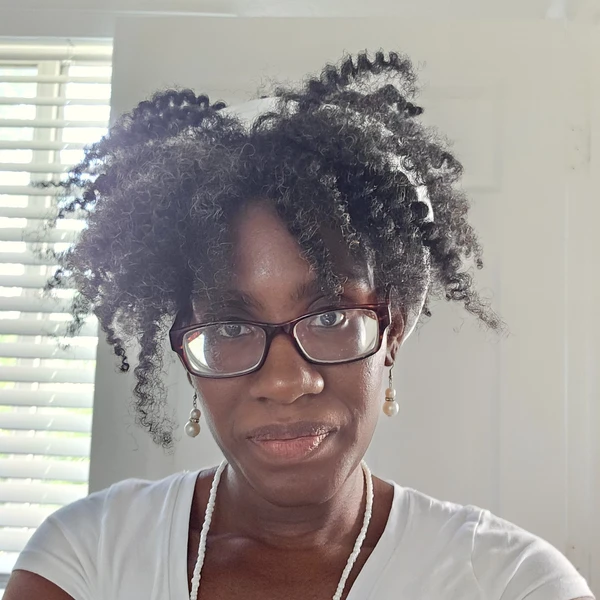
Hobbies and interests
Community Service And Volunteering
Beach
Counseling And Therapy
Choir
Dance
Drums
Exploring Nature And Being Outside
Gardening
History
Journaling
Karaoke
Learning
Mental Health
Music
Piano
Writing
Theater
Songwriting
Self Care
Singing
Reading
Psychology
Poetry
Human Rights
Spirituality
Reading
Action
Adventure
Book Club
Biography
Classics
Contemporary
Cultural
Drama
Education
Family
Fantasy
Folk Tales
Folklore
History
Historical
Literary Fiction
Literature
Magical Realism
Suspense
Tragedy
Spirituality
Social Issues
Retellings
Romance
Realistic Fiction
Plays
True Story
Criticism
Philosophy
Music
Novels
Mystery
Adult Fiction
Short Stories
Thriller
I read books daily
Charity Moore
963
Bold Points1x
Finalist
Charity Moore
963
Bold Points1x
FinalistBio
I’m a Psychology major with a passion for trauma healing in African American communities. As a first-generation college student and mother, I’m committed to becoming a licensed mental health counselor focused on culturally responsive care. I want to break generational cycles of silence and stigma around mental health and bring accessible, trauma-informed support to underserved communities. This journey is both personal and purposeful and with support, I aim to turn my academic goals into long-lasting change.
Education
Florida International University
Bachelor's degree programMajors:
- Psychology, General
Broward College
Associate's degree programMajors:
- Psychology, General
Miscellaneous
Desired degree level:
Master's degree program
Graduate schools of interest:
Transfer schools of interest:
Majors of interest:
Career
Dream career field:
Mental Health Counseling
Dream career goals:
Public services
Volunteering
Jack and Jill Center — Volunteer2020 – 2020
Future Interests
Advocacy
Volunteering
Philanthropy
Entrepreneurship
Linda Hicks Memorial Scholarship
Domestic violence left invisible scars on my body, my spirit, and the rhythm of my daily life. For years, I lived under the control of a man who was supposed to love me. He was more than 15 years older than I was, and from early on, he used that difference to control, belittle, and manipulate me. He didn’t just want partnership; he wanted power. He controlled our finances, stole from me to keep me dependent, and dictated my every move. I was isolated, silenced, and stripped of my independence. I survived sexual assaults, physical violence, and even a horrifying moment when he tried to kill me and my children during an argument. I left with nothing but the clothes on our backs. I ended up escaping with the help of my father while he was at work.
What followed was a long, grueling process of healing. I spent over a year in a domestic violence shelter, attended court hearings, filed injunctions, and fought for my safety and my children’s. It was there, in that shelter, surrounded by other women with broken hearts and fractured homes, that I began to understand that survival was only the beginning. Healing (real healing) needed a safe space, emotional guidance, and trauma-informed support. I didn’t just want to survive anymore. I wanted to thrive. And more than that, I wanted to be a part of helping other women do the same.
This experience, as painful as it has been, is one of the biggest reasons why I am now pursuing a degree in Psychology. My long-term goal is to become a licensed mental health counselor who specializes in trauma recovery for African American women and children. As someone who has lived through abuse and now parents alone while recovering from PTSD, I know how deep the wounds run, and how often they’re dismissed; especially when you’re Black, female, and struggling to be strong in a society that expects you to suffer silently.
I plan to use my education to not only provide individual counseling but to create a safe haven, both physical and emotional, for women and children leaving abuse. I envision a trauma-informed community center that offers culturally relevant therapy, parenting support, legal guidance, and expressive healing through music, art, and storytelling. I want to change the way we care for survivors. Not with judgment or pity, but with dignity, empowerment, and a path toward wholeness.
African American women are disproportionately affected by domestic violence and often receive the least support. Through my work, I want to improve communication between care providers, law enforcement, and shelters. I want to train professionals to understand the cultural context of our trauma. I want to coordinate services so that no woman feels like she has to choose between safety and survival.
I didn’t choose what happened to me. But I can choose what I do with it. And I choose to turn my pain into purpose; to become the person I once needed, for someone else who has no idea yet how strong she really is.